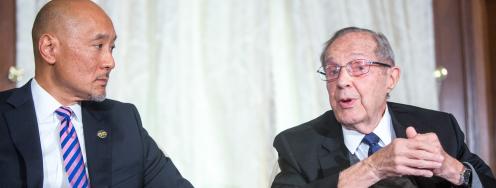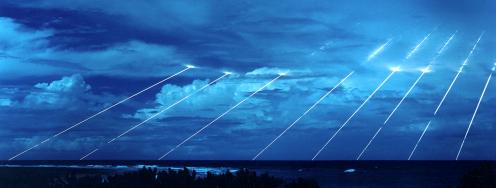Must We Keep Living Under the Sword of Damocles?
The following is the third in a series of guest posts from graduate students reflecting on the 25th anniversary of Rekyavik.
Twenty-five years ago, two of the leaders of the world’s greatest military powers sat together at the Hofdi House in Reykjavik, Iceland. They were President Ronald Reagan and Soviet leader Mikhail Gorbachev, and they met to discuss the possibility of eliminating all nuclear weapons.
Was it successful? First consider the remarks of those who saw it as a failure: According to former Secretary of Defense James Schlesinger, Reykjavik was “a near disaster from which we were fortunate to escape.” Richard Nixon weighed in that, “no summit since Yalta has threatened Western interests so much as the two days at Reykjavik.”
Really? Did the discussion at Reykjavik of possibly abolishing nuclear weapons threaten our interests? Were we really “fortunate to escape” from the world without a nuclear weapons and to live today’s world of nuclear proliferation and threats of nuclear terrorism?
Look at the nuclear threats we face today: not only do Iran’s enriched uranium nuclear program and North Korea’s nuclear tests highlight our security problems in nuclear era but the spread of nuclear weapons to these weak or fragile states has increased their likelihood of their falling into the hands of terrorists. Consider the recent situation in Libya: Western officials and analysts are greatly concerned over the dispersal of the shoulder-fired antiaircraft missiles to terrorist groups since the fall of the Qaddafi government. “In the wrong hands these systems could pose a potential threat to civil aviation,” says Andrew Shapiro, the assistant secretary of state for political-military affairs. Now, imagine if these were nukes.
Critics of nuclear disarmament insist that nuclear weapons are essential to maintain international security because they are a means of deterrence. But does their argument prove valid in the post-Cold War era where the idea of mutual deterrence has become more obsolete? True, there were some security benefits to having nuclear weapons during the Cold War. But these benefits are now far outweighed by the security threats nuclear weapons pose. The risk of using nuclear weapons continues as long as these weapons exist: we can prevent nuclear proliferation and terrorism only through eliminating all nuclear weapons.
This call for the nuclear abolition is a vision that was mutually shared by Reagan and Gorbachev at Reykjavik. Though the summit failed in achieving the goal of agreement to eliminate all nuclear weapons, it indicates how leaders with strong belief in nuclear disarmament can act on that belief to potentially make breakthroughs.
The value of Reykjavik is re-echoed by the bipartisan appeal from Republicans George Shultz and Henry Kissinger and Democrats William Perry and Sam Nunn that was published in 2007 and 2008 Wall Street Journal op-eds, in which they called for an action plan to move towards the goal of a world free of nuclear weapons.
A movement toward abolishing nuclear weapons has been supported by many other former U.S. officials regardless of their political stances or affiliations. And this vision of a world free of nuclear weapons is a guide to our thinking about nuclear policies: As President Obama emphasized in his 2009 Prague speech, it has become “America’s commitment to seek the peace and security of a world without nuclear weapons.”
As we mark the 48th anniversary of his assassination, we should remember the words of U.S. President John F. Kennedy, who warned that “every man, woman, and child lives under a nuclear sword of Damocles, hanging by the slenderest of threads, capable of being cut at any moment.” Efforts to mend this fraying cord do not provide a sufficient safeguard. Only a complete elimination of the sword can end this threat. The echo of Reykajvik will continue to resonate until we would no longer live under the nuclear sword of Damocles.
Sunyoung Ahn is a graduate student in the Security Studies Program at Georgetown University's Edmund A. Walsh School of Foreign Service where she specializes in international security and nuclear weapons issues.



